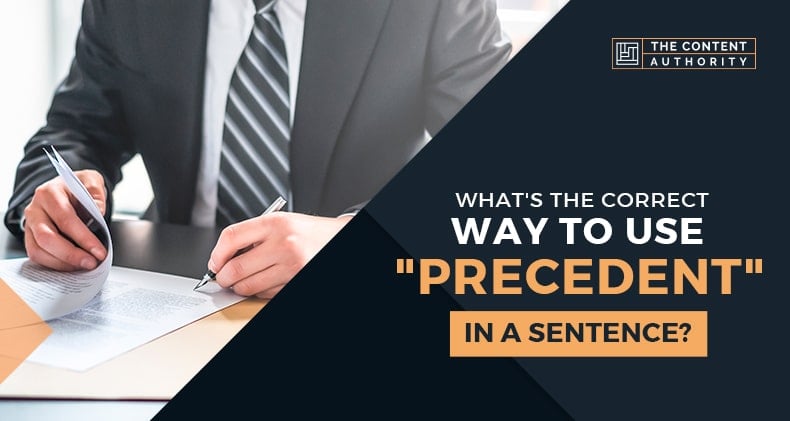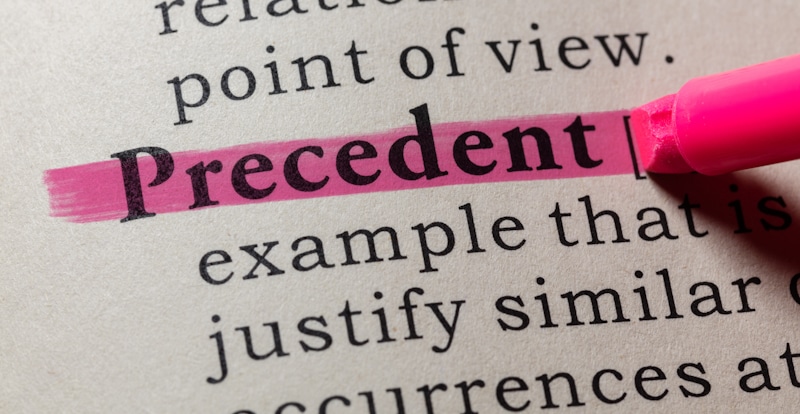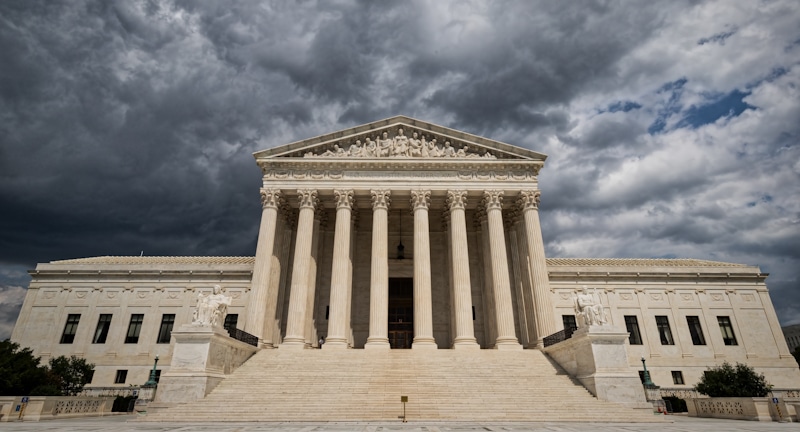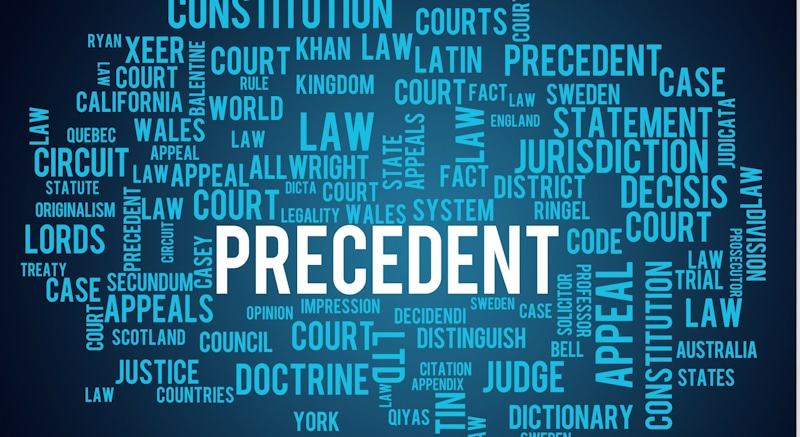Pretty much nothing in the world is truly original or has had no inspiration whatsoever. Every act committed or word spoken is sure to have had its influence. And in the case of things with “historical significance”, there has to be some “precedent”.
A “precedent” is “anything that serves as an explanation or guidebook for existing events”. Most court rulings are based on precedent. The word is therefore commonly used in legal texts. When using the term in non-legal contexts, be wary of not confusing it with “precedence”, which means “priority”.
It’s not that difficult to incorporate “precedent” into texts. But because the term has a similar spelling and sound to words such as “president”, “precedence”, etc., it could pose challenges to some people while writing. Keep reading to learn more about the word, how to use it in texts, etc.
“Precedent” – Meaning
The term “precedent” means “a previous occurrence of a thing similar to an existing happening”. The word has its origin in “praesidere”, a Latin term meaning “to preside over”. Unsurprisingly, it’s not pronounced the same way as “precedent”.
Kindly note, “precedent” and “precedence” are not the same, or the latter is not the former’s noun version. “Precedent” is already a noun. The word “precedence” means “priority”. It’s related to “rank” or “what comes first”.
Synonyms or terms related to “precedent” include “model”, “example”, “standard”, “antecedent”, “foregoing“, “anterior”, etc.
“Precedent” in the Legal World
Look up the word “precedent” online and you’ll find most results explaining the term from a legal perspective. That gives away how significant a word or concept “precedent” is in the court of law and the legal sector.
In the legal context, “precedent” means “a rule or principle created in an earlier legal case to help with subsequent cases dealing with similar facts or issues”. It’s a “statement, act, case, or legal decision that could serve as a reason, an example, or reasoning for a later case”. Generally, legal systems put major emphasis on principled rules as that would likely yield predictable and similar outcomes.
Courts must apply “precedents” to existing cases similar to those observed before, as per the “stare decisis” doctrine. This ensures that individuals in similar scenarios are treated alike or similar to before, and not as per the judge’s knowledge or biases. While all prior rulings on cases are “precedents”, only some “landmark decisions” or “benchmark cases” get cited often.
Not to mention, if the facts of a particular case are unique or have no similarities with cases dealt before, the case is deemed to have no “precedent”. The chances of that happening, however, are incredibly slim or pretty much non-existent. And when a case being handled is genuinely inimitable, the ruling on the case sets a “precedent”.
And if a case contradicts a general practice or custom or an established precedent, it’s said to “go against precedent” or “break with precedent”. If a prior ruling or example does not reinforce a case ruling, it’s referred to as “without precedent”. Something that’s “without precedent” can also be referred to as “unprecedented”.
How Courts Use “Precedent”?
Constitutional amendments are usually short and written in broad terms. Courts try to interpret those general terms upon hearing specific lawsuits. For example, “cruel punishment” is prohibited according to the Eight Amendment (U.S. constitution). But the phrase “cruel punishment” is vague and subject to interpretations.
In other words, there’s no easy or definite way to determine what the term implies or how the courts can sentence the guilty. In America, “execution” is legal. In some other countries, it’s considered “cruel”. In such scenarios, judges are expected to skim through similar cases or look for “precedents” to determine how the convict was punished.
Judges must use “precedents” as a point of reference and not replicate them. They must be able to explain why a particular punishment has been handed down. Also, cases that are cited should have stayed as “good law”. It means the cases should not have been reversed or overruled later.
Using the Word “Precedent” in Texts
The term “precedent” is a noun, and it’s usually used in texts as it is. Also, since “precedent” is commonly used in the legal community, it’s standard to use the word in legal texts. For example:
- When the court ruled the case in the parent’s favor, it created a precedent to end discrimination in public schools.
- Appeal panels aren’t limited by precedent or any percentage of appeals they should uphold in favor of the parents.
- One major cause of the division was the common law courts’ unyielding adherence to precedents.
Here are a few sentences that use “precedent” in non-legal contexts:
- The prime minister followed historical precedent and formed the cabinet.
- He set a precedent.
- Whether the business merger works better with or without his presence, the way they removed the CEO sets a dangerous precedent.
- It will set a poor precedent and will be unworthy of its spirit.
As mentioned above, “precedent” and “precedence” are words with different meanings and cannot be used interchangeably. But because the two have similar pronunciations and spellings, it’s not that difficult to get confused between the homophones. For example:
- Preventing violent crimes typically takes precedent over economic and fraud crimes.
It should have been “precedence” instead of “precedent” in the sentence above. Not to mention, the words “precede”, “preceded”, and “preceding”, etc., are inflections of “precedence” and not “precedent”.
Confusion Between “Precedent” and “President”
Another relatively common confusion is using “president” instead of “precedent” in texts, or vice versa. The mistake is typical among non-native speakers who may not be familiar with the word “precedent”.
The word “president” is a lot more commonly used term than “precedent”. That, however, is no excuse to get mixed up between the two. Just reading the sentence in its entirety would clarify how incorrect the term “president” is in a sentence where the right word to use is “precedent”.
This misperception extends to the terms’ inflections as well. For instance, “precedented” can be at times written as “presidented”. Here are a few example sentences illustrating the incorrect uses of the terms:
- She said that wasn’t the norm and also not presidented.
- The provision introduced a dangerous president.
If you’re using a tool like MS Word, Google Docs, or any similar word processor to write your scripts, glaring errors like the above usually get highlighted by the program itself, which luckily makes it impossible not to notice the blunder.
In case you were wondering how to use “precedence” in texts, here are a few sentences illustrating “precedence” doesn’t mean the same thing as “precedent”:
- Her supply order takes precedence as it came in first.
- Placement and precedence were abolished in the workplace to communicate the message that all employees were equal.
- Corporate profits have always taken precedence over the environment.
- Tradition has always taken precedence over everything else in their family.
- Though new games have arrived on the platform in recent times, retaining the existing games’ look and feel still takes precedence.
- Today should always take precedence because there is no tomorrow without it.
Example Sentences with the Term “Precedent”
The following is a list of sentences incorporating the term “precedent” correctly, both in legal and non-legal scenarios:
- That created precedent for the remainder of the exhibition.
- The move represented an extremely worrying precedent.
- The technological breakthroughs are astonishing and have zero precedent in reality.
- There was zero precedent for such an undertaking under such modern circumstances.
- The verdict had zero precedent.
- Precedents assist with future decision-making, but they may also constrain those judgments.
- The precedents set will hopefully pave the path for other liberation movements across the globe.
- Hypothetical cases are nothing but unique kinds of precedents.
- Let us not assume there are zero precedents for that.
- There are quite a few precedents that require salvaging before attempts are made to reinvent the wheel.
- She analyzed the precedents before proposing her inventions.
- Cultural precedents can help reconstruct history only partially.
- Modern science may not recommend the technique, but it’s worth mentioning that the method has some illustrious precedents.
- The judges intended to borrow from non-legal precedents too.
- By ruling in favor of gay marriage, the precedent being set was something even the court may not have truly come to terms with.
- The committee would actively look for a precedent so that it could determine the next course of action.
Conclusion
Due to its proximity to “president” and “precedence”, “precedent” could become a challenging word to work with while composing texts. But if you get to know more about those other terms and how etymologically distinct they are from each other, the uncertainty may not arise. Most native speakers have no issues delineating the three. It’s just the ESL (English as a Second Language) speakers who struggle with the terms.
Hopefully, this article quashes all doubts you may have about “precedent”, how to use the word in your writings, and how not to confuse it with similar-sounding words. Each time you feel unsure of using “precedent” in your texts, refer to this article for some much-needed clarity.
Shawn Manaher is the founder and CEO of The Content Authority. He’s one part content manager, one part writing ninja organizer, and two parts leader of top content creators. You don’t even want to know what he calls pancakes.




